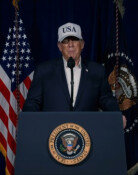[Column] Change in N.Korea needs scrutiny
[Column] Change in N.Korea needs scrutiny
Posted January. 17, 2001 14:21,
![[Column] Change in N.Korea needs scrutiny](https://dimg.donga.com/egc/CDB/ENGLISH/Article/20/01/01/17/2001011714228.jpg)
North Korea appears busy attempting rapid changes as the New Year began. Before everything else, Kim Jong-Il's commentary that appeared in the Rodong Sinmun on Jan. 4 under the heading "The 21st century is a century of vast changes and creativity," might represent his new thinking that he will run the state from a new standpoint to suit a new age.
Kim's visit to China rivets keen attention on the concept of his new thinking.
Combinations of factors have given rise to his new thinking at this time. First, he must have come to the conclusion that the backwardness of industry and inefficiency of the system no longer could sustain the existing mode of economic operation. Aids from the outside including South Korea have narrowly tided North Korea over food shortages, but economic development cannot be achieved with external assistance only. Building a strong economic power base would be impossible without motivating the populace and adapting them to the fast growth of science and technology. While continuing to intensify ideological indoctrination, as was affirmed in "The Historical lesson of socialist construction," new thinking has been presented as a fresh thesis to answer the call of the prevailing reality.
Second, the Chinese model of socialist development, which pursued reform and opening over the past two decades, generated new expectations and inducement to emulation. Under the Chinese model a political system centered around the Communist Party is maintained and a framework of market economy is introduced across the board to promote economic development. Two systems in one country are to be retained pending reunification. Pyongyang concluded that the approach has been positive. In some socialist countries the old political order collapsed, but in China the political system remains quite alive and kicking. It appears certain that the political system of China will survive ¡°the machinations of imperialist¡± and ¡°maneuvering by traitors at home.¡± North Korea is convinced of continued Chinese support for Pyongyang despite Beijing's normalization of relations with South Korea. That no doubt led to North Korea's confidence to propose a new thinking.
Third, North Koreans felt the need to devise new strategies and measures to deal with the Korea policy of the incoming George W. Bush administration. Pyongyang gained many rewards from the Clinton administration in the past eight years by effectively utilizing nuclear and missile issues. However, the same cannot be repeated in relations with the new Washington administration. The new thinking of the National Defense Commission chairman focuses fundamentally on a shift of the method of economic growth; as improved ties with the United States holds the key to its economic recovery, forging a fresh relationship with Washington would be a crucial task. The advocacy of new thinking means to send a message on improving U.S. ties indirectly, while fostering a favorable climate at home.
Fourth, the North's assessment of its broadened exchange with the South since the June 15 summit statement was favorable, as it brought the north better results, both in terms of symbolism and practical benefit, than had been expected. In order to take advantage of inter-Korean projects such as the construction of Kaesong industrial estate and the relinking of the cross-border Seoul-Shineuiju rail line going into high gear this year, the new thinking seeks to reinforce the ideological discipline and the operation of the system. What is more, on the eve of Kim's planned return trip to Seoul, the new thinking could provide a highly useful guide for the members of the North Korean elite to rally behind the advanced leadership of the Dear Leader.
Rather than holding out wishful expectations on the new thinking of Kim, the Seoul government should engage in sober preparedness. The new thinking might be a realistic yardstick by which to measure the problems facing North Korea, but it is yet to be ascertained how it could replicate the Chinese model by providing solutions, ameliorating the living standard of the people and thus ensuring the stability of the system.
We will have to watch out for the recent North Korean conduct-- of advocating new thinking on one hand and, on the other, of strengthening its ideological foundation ("Uphold the Dear Leader to the death" or "Military power before politics") or emphasizing independent resolution of the Korean question and reunification of the country under a federal formula.
North Korea apparently is getting closer to China through the new thinking. What kind of change can North Korea bring to Northeast Asia amid new Sino-American relations and what role will China play in the Korean peninsula with its rapidly growing influence over the Korean peninsula? We must stay alert and hammer out multiple countermeasures.
Yu Ho-Yol, professor of North Korean studies at Korea University




![[단독]폴란드, 韓 해군 최초 잠수함 ‘장보고함’ 무상 양도 안받기로](https://dimg.donga.com/c/138/175/90/1/wps/NEWS/IMAGE/2026/02/27/133437397.1.jpg)


